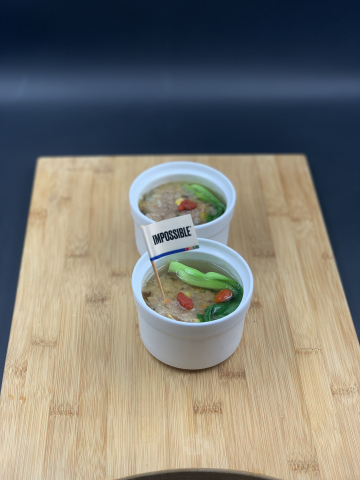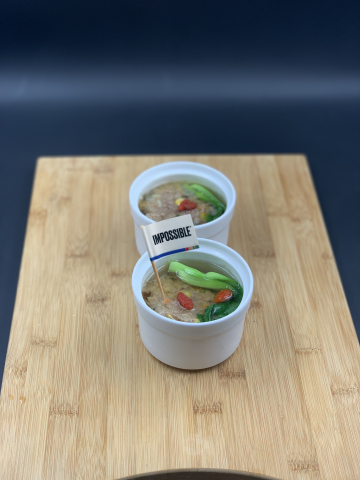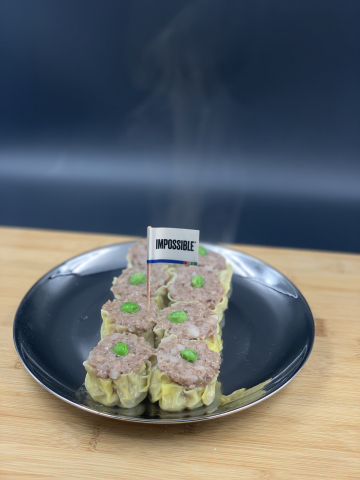SHANGHAI, China--(BUSINESS WIRE)--The Impossible Burger will make its formal debut in China this week at the China International Import Exposition, the world’s largest expo dedicated to trade liberalization and economic globalization.
Impossible Foods expects to serve nearly 50,000 free samples of its award-winning, plant-based product during the show’s VIP preview Nov. 5 and during the public show days Nov. 6-10 at the National Exhibition and Convention Center in Shanghai. The event, now in its second year, attracts tens of thousands of people per day -- from senior government officials in Beijing and regional capitals to buyers, sellers and entrepreneurs from China and 64 other countries.
On the first public show day, Nov. 6, Impossible Foods will host cooking shows with celebrity MasterChef Jereme Leung, one of the most influential chefs in the modern Chinese culinary movement.
Chef Leung, who began his cooking career at the age of 13, is considered a genius for his mastery of all four schools of Chinese cooking: dim sum, barbecue, wok cooking and knife work. Throughout CIIE, he will be showcasing Impossible’s plant-based meat in a variety of modern Chinese dishes, including Impossible Lion’s Head Dumpling in Broth and Impossible Siew Mai.
“Impossible Foods has mastered making meat that’s delicious and sustainable. Juicy, tender and incredibly flavorful, the Impossible meat has the same delicate texture and fine color as real beef,” said Jereme Leung. “This revolutionary product from California blends seamlessly with traditional Chinese cuisine, and the wonderful chemistry between them delivers rich taste. In addition, with a much smaller carbon footprint, plant-based meat is an environmentally friendly food option offering a new solution for the sustainable development of our ecosystem.”
Making the global food system sustainable
China is the world’s most populous nation and the biggest consumer of meat. It consumes 28% of the world’s meat today, and demand is skyrocketing as the country’s economy continues to grow.
But humanity’s use of animals as a food-production technology has brought us to the verge of environmental catastrophe: The destructive impact of animal agriculture on the global environment far exceeds that of any other technology on Earth. The greenhouse gas footprint of animal agriculture rivals that of every car, truck, bus, ship, airplane, and rocketship combined. Animal agriculture pollutes and consumes more water than any other industry.
Raising animals for food makes up the vast majority of the land footprint of humanity. All the buildings, roads and paved surfaces in the world occupy less than one percent of Earth’s land surface, while more than 45% of the land surface of Earth is currently in use as land for grazing or growing feed crops for livestock. The global demand for meat, fish and dairy foods is a primary driver of the ongoing meltdown in diverse wildlife populations and ecosystems on land and in oceans, rivers and lakes.
Making meat directly from plants has tremendous individual and public health benefits -- from reducing hypertension and diabetes to decreasing the threats of antibiotic resistance, superbugs, influenza and other pandemics.
“China is well positioned to be a world leader in the shift to a sustainable food system,” said Impossible Foods’ CEO and Founder Dr. Patrick Brown. “Impossible Foods wants to partner with China to create the world’s most resilient, secure and sustainable food system -- a model for other nations. By transitioning to plant-based meat, China can help boost quality of life for everyone, avert biodiversity collapse and reduce the impact of global warming.”
Impossible Foods does not currently sell its product in mainland China. It’s hosting a booth in the CIIE’s “California Pavilion” organized by the Bay Area Council.
Since the establishment of its first office in Shanghai in 2008, the Bay Area Council China Initiative has provided business development and support services to Bay Area entrepreneurs and businesses accessing the China market while helping Chinese companies expanding to the Bay Area. Today, the Council also has offices in Beijing, Hangzhou and Nanjing.
Designed to disrupt, built to scale
Founded in 2011 by Brown, a Stanford biochemistry professor emeritus and former pediatrician, Impossible Foods makes meat from plants with a much smaller environmental footprint than meat from animals. The company uses modern science and technology to create wholesome food, restore natural ecosystems, and feed a growing population sustainably. Impossible Foods’ mission is to eliminate the need for animals in the food chain by 2035. Read Brown’s blog to learn more about the company’s mission.
At the International Consumer Electronics Show in January 2019, Impossible Foods launched the award-winning and “shockingly good” Impossible Burger 2.0 -- the company’s first significant product upgrade. The Impossible Burger, the first food ever featured at CES’ roster of game-changing technologies, won the show’s top prizes.
Since the launch of 2.0, Impossible Foods’ sales have surged. Growth has come from every sales category in which the company does business -- independent restaurants, large US restaurant chains such as White Castle, Burger King, Red Robin, Cheesecake Factory and Qdoba, and non-commercial outlets such as theme parks, museums, stadiums, and college campuses.
Since launching in Singapore in March 2019, sales have increased more than five-fold in Asia. Impossible Foods’ plant-based meat is sold in a wide range of restaurants and cuisines throughout Hong Kong, Singapore, and Macau -- including internationally celebrated establishments by David Myers, Gordon Ramsay and Wolfgang Puck.
In April, the world’s second largest burger chain, Burger King, debuted the Impossible Whopper in a regional test in St. Louis, in the middle of the United States. The 59-unit regional test of the Impossible Whopper at Burger King restaurants in St. Louis went exceedingly well; the Miami-based restaurant chain rolled out the Impossible Whopper in August to 7,200 U.S. restaurants nationwide.
About Impossible Foods:
Based in California’s Silicon Valley, Impossible Foods makes delicious, nutritious meat and dairy products from plants — with a much smaller environmental footprint than meat from animals. The privately held company was founded in 2011 by Patrick O. Brown, M.D., Ph.D., Professor Emeritus of Biochemistry at Stanford University and a former Howard Hughes Medical Institute investigator. Investors include Khosla Ventures, Bill Gates, Google Ventures, Horizons Ventures, UBS, Viking Global Investors, Temasek, Sailing Capital, and Open Philanthropy Project.
More information:
impossiblefoods.com
Media kit:
www.impossiblefoods.com/media



